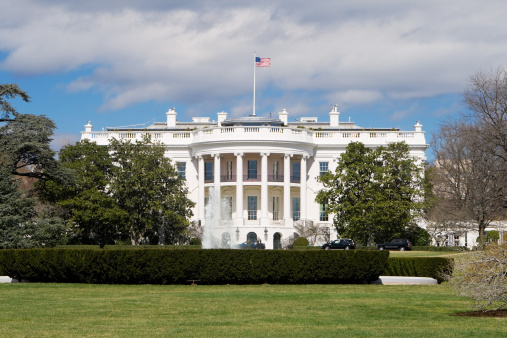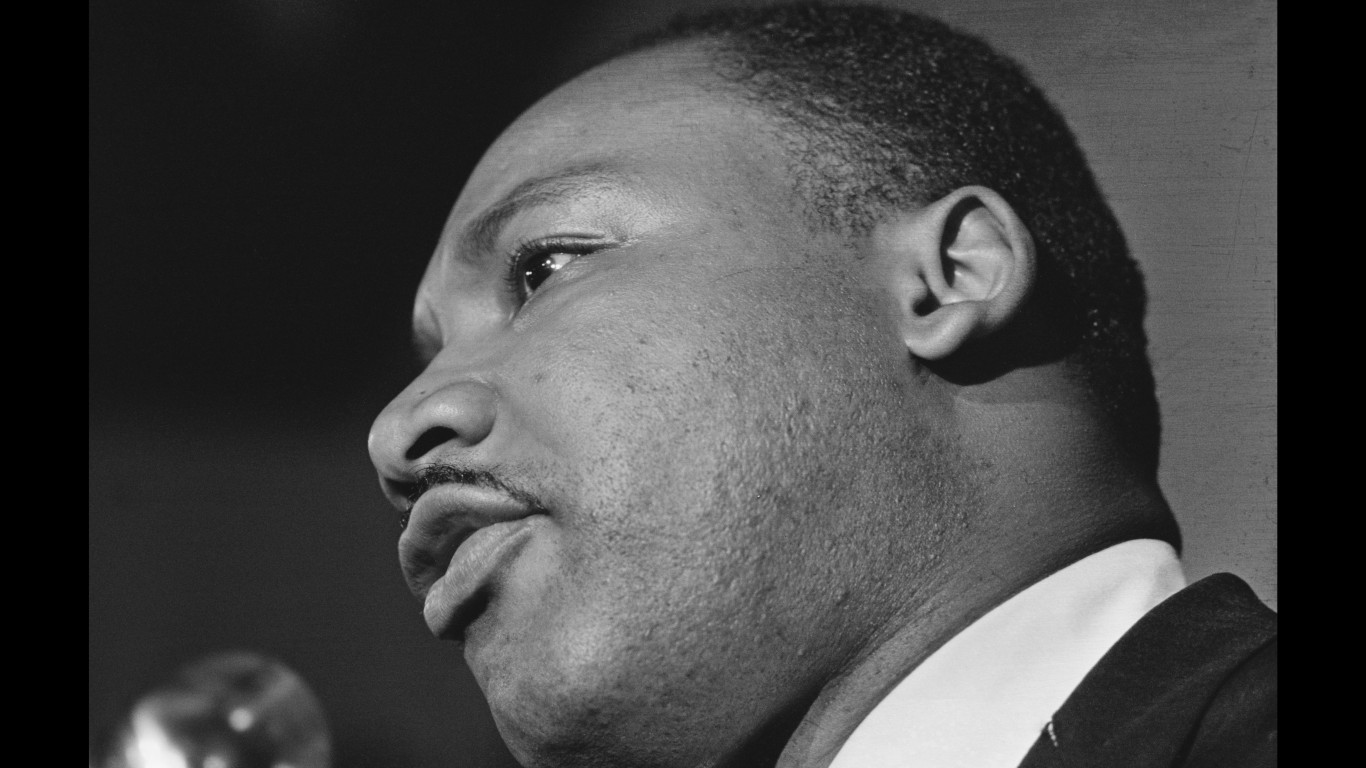Three years ago, 24/7 Wall St. published the net worth of every American president, from Washington to Obama. We have updated our numbers to reflect the earnings of the still-living presidents. One thing remains clear: it pays to be president, especially after leaving office. 24/7 Wall St. examined the finances of all 43 presidents to identify the richest.
In our updated list, the only currently living president who makes the wealthiest list is Bill Clinton, who now has an estimated net worth of $55 million. Clinton continues to make millions of dollars in speaking fees. This January, following an email from Bill Clinton to supporters, Hilary Clinton’s 2008 campaign debt was paid off.
Click here to see The Ten Richest Presidents
President Obama is not one of the wealthiest presidents of all times. Yet his net worth increased from $5 million in 2010 to an estimated $7 million, primarily from his book sales. If Bill Clinton is any indication, Obama can expect to make much more money in speaking engagements once he exits office in 2017.
The net worth of the presidents varies widely. George Washington amassed over half a billion in today’s dollars, while other presidents went bankrupt. The fortunes of America’s presidents are often tied to the economy of their time. Over time, as the focus of the economy has changed, so has the way the presidents made their money.
It is not surprising then to find that the first few presidents — from Washington’s election to about 75 years later — were large landowners. They generally made money from land, crops and commodity speculation. Of course, this left them highly vulnerable to poor crop yields, and they could lose most or all of their properties because of a few bad years. Similarly, they could lose all of their money through land speculation — leveraging the value of one piece of land to buy additional property.
By 1850, the financial history of the presidency entered a new era. Beginning with Millard Fillmore, most presidents were lawyers who spent years in public service. They rarely amassed large fortunes and their incomes often came almost entirely from their salaries. These American presidents were distinctly middle class and often retired without the means to support themselves in anyway close to the presidential lifestyle. Buchanan, Lincoln, Johnson, Grant, Hayes and Garfield had modest net worths when they died.
At the end of the 19th century and beginning of the 20th, there was another significant change to the economy. Large, professionally organized corporations in the oil, mining, financial and railroad sectors allowed individuals to amass large fortunes. The Kennedys were wealthy because of the financial empire built by Joseph Kennedy. Herbert Hoover made millions of dollars as the owner of mining companies. Indeed, since the early 20th century, the fortunes of many presidents, including Theodore Roosevelt, Franklin D. Roosevelt, John F. Kennedy and both of the Bushes were driven by inherited wealth.
The net worth figures for the 10 wealthiest presidents are in 2010 dollars. Because several of the presidents, particularly in the early 19th century, made and lost huge fortunes in a matter of a few years, the net worth of each president is for the peak time. The exception to the 2010 rule are the presidents who are still living, who have more recent earnings. In the case of each president, we have taken into account hard assets such as land, estimated lifetime savings based on work history, inheritance and homes. Wages considered were earned for services as varied as collector of customs at the Port of New York to royalties on books, as well as ownership of companies and yields from family estates.
This is 24/7 Wall St.’s list of the richest U.S. presidents.
10. John Fitzgerald Kennedy
> Net worth: $1 billion (never inherited his father’s fortune)
> In office: 1961 to 1963
> 35th president
Born into great wealth, Kennedy’s wife was an oil heiress. His father was one of the wealthiest men in America and was the first chairman of the Securities and Exchange Commission. Almost all of JFK’s income and property came from a trust shared with other family members.
9. William Jefferson Clinton
> Net worth: $55 million
> In office: 1993 to 2001
> 42nd president
Unlike many presidents, Bill Clinton did not come from a wealthy family, nor did he have lucrative employment before his presidency. But since leaving office we estimate that Clinton has earned more than $125 million before taxes, with the vast majority of that coming from speaking fees. Clinton’s net worth was reduced in 2008 when his wife, Hillary Clinton, wrote off more than $13 million she loaned her campaign for her own presidential bid. Her campaign debt, once over $25 million, was just retired in January.
8. Franklin Delano Roosevelt
> Net worth: $60 million
> In office: 1933 to 1945
> 32nd president
Roosevelt’s wealth came through inheritance and marriage. He owned the 800-acre Springwood estate, as well as properties in Georgia, Maine and New York. In 1919, his mother had to bail him out of financial difficulty. He spent most of his adult life in public service. Before he was president, Roosevelt was appointed assistant secretary of the Navy by President Wilson.
7. Herbert Clark Hoover
> Net worth: $75 million
> In office: 1929 to 1933
> 31st president
An orphan, Hoover was raised by his uncle, a doctor. He made a fortune as a mining company executive. He had a very large salary for 17 years and had extensive holdings in mining companies. Hoover donated his presidential salary to charity. He also owned “Hoover House” in Monterrey, Calif.
6. Lyndon Baines Johnson
> Net worth: $98 million
> In office: 1963 to 1969
> 36th president
Johnson’s father lost all the family’s money when LBJ was a boy. Over time, the 36th president accumulated 1,500 acres in Blanco County, Texas, which included his home, called the “Texas White House.” He and his wife owned a radio and television station in Austin, Texas, and had a variety of other moderate holdings, including livestock and private aircraft.
5. James Madison
> Net worth: $101 million
> In office: 1809 to 1817
> 4th president
Madison was the largest landowner in Orange County, Va. His land holding consisted of 5,000 acres and the Montpelier estate. He made significant wealth as Secretary of State and president. Madison lost money at the end of his life due to the steady financial collapse of his plantation.
4. Andrew Jackson
> Net worth: $119 million
> In office: 1829 to 1837
> 7th president
While he was considered to be in touch with the average middle-class American, Jackson quietly became one of the wealthiest presidents of the 1800s. “Old Hickory” married into wealth and made money in the military. His homestead, The Hermitage, included 1,050 acres of prime real estate. Over the course of his life, he owned as many as 300 slaves. Jackson entered considerable debt later in life.
Also Read: The Net Worth Of The American Presidents
3. Theodore Roosevelt
> Net worth: $125 million
> In office: 1901 to 1909
> 26th president
Born to a prominent and wealthy family, Roosevelt received a sizable trust fund. He lost most of his money on a ranching venture in the Dakotas and had to work as an author to pay bills. Roosevelt spent most of his adult years in public service. His 235-acre estate, Sagamore Hill, now sits on some of the most valuable real estate on Long Island.
2. Thomas Jefferson
> Net worth: $212 million
> In office: 1801 to 1809
> 3rd president
Jefferson was left 3,000 acres and several dozen slaves by his father. Monticello, his home on a 5,000-acre plantation in Virginia, was one of the architectural wonders of its time. He made considerable money in various political positions before becoming president, but was mired in debt towards the end of his life.
1. George Washington
> Net worth: $525 million
> In office: 1789 to 1797
> 1st president
His Virginia plantation, Mount Vernon, consisted of five separate farms on 8,000 acres of prime farmland, run by more than 300 slaves. His wife, Martha Washington, inherited significant property from her father. Washington made well more than subsequent presidents: his salary was 2% of the total U.S. budget in 1789.
The #1 Thing to Do Before You Claim Social Security (Sponsor)
Choosing the right (or wrong) time to claim Social Security can dramatically change your retirement. So, before making one of the biggest decisions of your financial life, it’s a smart idea to get an extra set of eyes on your complete financial situation.
A financial advisor can help you decide the right Social Security option for you and your family. Finding a qualified financial advisor doesn’t have to be hard. SmartAsset’s free tool matches you with up to three financial advisors who serve your area, and you can interview your advisor matches at no cost to decide which one is right for you.
Click here to match with up to 3 financial pros who would be excited to help you optimize your Social Security outcomes.
Have questions about retirement or personal finance? Email us at [email protected]!
By emailing your questions to 24/7 Wall St., you agree to have them published anonymously on a673b.bigscoots-temp.com.
By submitting your story, you understand and agree that we may use your story, or versions of it, in all media and platforms, including via third parties.
Thank you for reading! Have some feedback for us?
Contact the 24/7 Wall St. editorial team.


